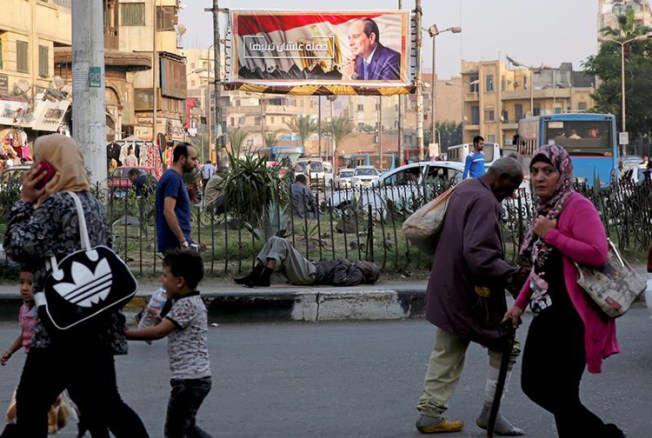The New York Times reported this week that Egypt ordered a criminal investigation into the paper over its report alleging that an intelligence officer told several TV hosts they should persuade viewers to accept President Donald Trump’s decision to recognize Jerusalem as Israel’s capital. The investigation comes in the same week that Egypt’s parliament voted for a third time to extend a state of emergency.
The New York Times reported that it “stands behind [the story],” but for local journalists, the renewed emergency measures ahead of elections in March make the tightening grip of censorship harder to ignore.
Under a state of emergency, police and the military have authority to take unspecified measures “to confront the dangers and funding of terrorism and safeguard security,” according to reports that cite a decree from the president’s office. Combatting extremism was one of President Abdel Fattah el-Sisi’s key promises in his first election campaign.
So far, authorities have used the state of emergency to censor media outlets and publications, bring “false news” charges against journalists who contradict official statements, refer civilians to military trial, and hold journalists incommunicado and in pre-trial detention indefinitely, according to CPJ research and news reports.
Since the measures were imposed in April 2017, CPJ has documented how:
- Prosecutors last month referred freelance journalist Ismail Alexandrani to military prosecution after keeping him in pre-trial detention for two years for allegedly belonging to and supporting the banned group, the Muslim Brotherhood. His lawyer Mokhtar Mounir said that the referral was dated December 13, but that he first learned of the decision this month, according to the independent news website Mada Masr and local rights group Association for Freedom of Thought and Expression. Alexandrani had covered the military’s efforts to combat extremist militias in the Sinai Peninsula–a conflict that the government has, in effect, banned independent reporting on, according to local journalists.
- Authorities have continued to punish journalists who were released or acquitted of charges by adding their names to a terrorist watch list. Courts last year put the names of at least eight journalists, including two acquitted of terrorism-related charges, on the list, which restricts their financial and civil rights, according to news reports.
- Police have used the right to detain suspects without trial or prosecution for up to seven days, and prosecutors have renewed the right to extend the pretrial detention period indefinitely. Of the 20 journalists jailed in Egypt at the time of CPJ’s last census, 12 had not been convicted of or sentenced for any crime. Police also held reporters Mohamed al-Hosseiny and Ahmed al-Sakhawy in incommunicado for six and four weeks respectively before state security prosecutors in October charged them with disseminating “false news,” according to CPJ research. Al-Hosseiny was stopped by police while interviewing parents about rising prices in downtown Cairo. Al-Sakhawy’s lawyer told CPJ that the journalist said that he was tortured in custody to confess that he and al-Hosseiny worked for TV stations owned by the Muslim Brotherhood. Egypt’s Ministry of Interior, which has oversight of the police and prison system, did not immediately respond to CPJ’s multiple emailed requests for comment.
- Between May 2017 and January 11, 2018, authorities blocked access to at least 465 websites, including those of news websites, blogs, rights organizations, and circumvention tools used to bypass such blocks, according to the Association for Freedom of Thought and Expression and the U.S. based Open Observatory of Network Interference. The state-owned Middle East News Agency reported that unspecified officials on May 24 ordered internet service providers to block access to 21 news websites that allegedly supported terrorism or reported “false news.” CPJ is also aware of at least four newspapers that authorities seized from the printers or suspended in the past year because of their critical coverage.
The blocking of sites led U.N. special rapporteur on freedom of expression David Kaye and special rapporteur on human rights and counter-terrorism Fionnuala Ní Aloáin to issue a statement in August that described Egypt’s actions as an “ongoing assault on freedom of expression.” The statement added, “Limiting information as the Egyptian government has done, without any transparency or identification of the asserted ‘lies’ or ‘terrorism.’ looks more like repression than counter-terrorism.”
Egypt is going into elections under a state of emergency and with a ban on assembly in place. Any further abuse of these powers to curtail the press risks undermining the democratic process and cutting citizens off from vital information.
